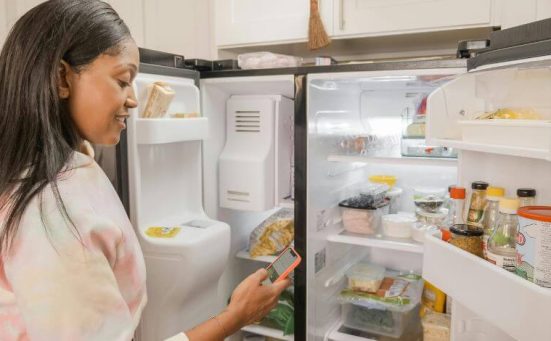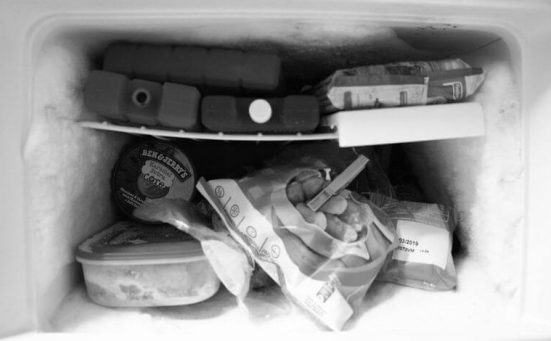
Does Turning Off The Fridge Damage It? (read this first)
With everyone looking to save energy (or money) many of us are turning off electrical appliances when they’re not being used. But is it a good idea to turn the fridge off for short periods of time?
Keep reading to find out.
Can You Turn The Fridge Off Overnight?
Many people have asked whether it’s OK to turn the fridge off at night when they’re sure that the door will not be opened. The answer is no, because the food inside needs to be kept below 5 C (40 F) to prevent any bacteria from forming.
Turning the fridge off for around 8 hours would allow the temperature inside the fridge to climb above the 5 degree C mark which could lead to bacterial growth on food. Which in turn could lead to illness once that food was consumed.
From an energy and financial perspective, you could potentially be worse off. Because it takes more energy to get the internal temperature of the fridge down to 5 C than it does to maintain that temperature by keeping it running constantly.
Does Turning Off A Fridge Damage It?
Turning the fridge off and then straight back on again can, in some cases, damage the compressor. Without a compressor the fridge won’t get cold so that would definitely damage the fridge.
When you turn a fridge off, the compressor stops working and the pressure in the system will start to reduce. The refrigerant will begin to settle which means the system will need some time to stabilise before it can safely be turned back on again.
If you were to plug it in and turn it on before the system has time to settle, the fridge’s components will need to work extra hard to operate correctly.
This could overheat the motor or damage the compressor and cause the fridge to stop working altogether.
You should always allow at least 15 minutes between turning a fridge off and turning it on again to prevent the compressor from having to work too hard.
There are, however, certain circumstances where turning off a fridge is a good idea.
If you’re planning a long trip away from home for longer than a month, it makes sense to turn the fridge off and unplug it along with all other electrical appliances.
There are, of course, a few steps you should take to ensure that the fridge will be safe to use on your return.
Safety Steps To Be Taken Before Unplugging The Fridge
Before you unplug your fridge, you should;
- Empty The Fridge
If you intend to leave your fridge unplugged for any length of time, you should remove everything from the fridge. This will prevent any bacteria or germs from forming and breeding. - Turn The Temperature Control & Ice Maker Off
Ensure the water supply and temperature control are turned off before unplugging the fridge. If you’re uncertain on how to do this, consult the user manual on your fridge. - Clean The Fridge
You should completely clean the whole fridge to prevent any bad smells or bacteria build ups. This includes the ice maker and all other parts of the fridge. Use baking soda as a cleaning agent and place a bowl of baking soda in the fridge after cleaning. - Dry The Fridge
Once the fridge is clean, dry it completely using a clean lint free cloth or kitchen paper. This will help prevent any bacterial or mould growth. - Leave The Fridge Door Open
Once the fridge has been washed and dried, it should be aired by leaving the door open to allow a steady, constant flow of air through the fridge. This will prevent any bad smells or mould growth from forming.
How To Restart Your Fridge
When you return after your trip, all you need to do is plug your fridge back in, switch the power on and remove the baking soda from the fridge.
Don’t forget to lower the temperature of the fridge and turn on the water supply for the ice maker.
If you have moved the fridge (to a new address or even to a different part of the room) it will need time to settle before it is turned back on. This can be anywhere between 2 to 4 hours (consult your handbook).
SEE ALSO: Does leaving your fridge door open overnight damage it?
Frequently Asked Questions
Turning your fridge off overnight will not save you any money because the components of the fridge will need to work harder to bring your fridge and its contents back down to a safe temperature. This will use as much, if not more power than allowing the compressor to cut in as and when needed overnight.
As with all electrical appliances, unplugging the fridge will not cause it any damage. What will damage it however, is unplugging it and then plugging it straight back in again. This is because of the way the compressor works to force the refrigerant through the system.
In general, as long as you keep the fridge door shut, it can be turned off for 4 hours before the food inside starts to perish.
It is not necessary to turn your fridge off when you go on holiday unless you’re planning to be away for longer than a month.
Leaving a fridge unplugged will not damage it. However, turning it off and then straight back on again can cause internal damage to the motor, compressor and other components. If you turn your fridge off, leave it at least 15 minutes before turning it back on again.



